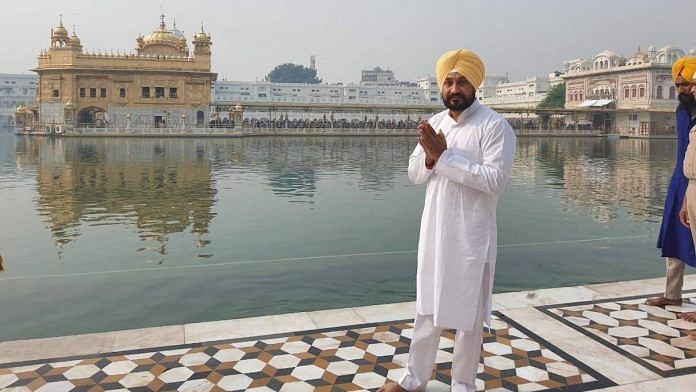The weekend started with an unexpected political bang. I was alerted to the drama in my former home state by a WhatsApp message that provoked me no end. A dear—non-Punjabi— friend sent a single line message ‘Why can’t Punjab be more like Gujarat?’ A classic non-sequitur. But I knew immediately then that Captain Amarinder Singh’s chief ministership was all over.
Just shy of a season before the next Punjab elections, Punjab Congress chief minister’s exit was unfolding in a swirl of speculation, rumour and lots of political gossip. Yes, this was all very unlike the quiet precision with which a new Bharatiya Janata Party (BJP) chief minister was installed in Gandhinagar earlier this month.
Good old-fashioned politics is back
My friend’s jibe about Punjab and Gujarat was, in effect, all about ‘signalling’. Words like ‘dignified’, ‘decisive’ and ‘well-ordered’ were used for the bland transition in Gujarat that the ruling BJP had managed with finesse and without much comment from the media. The Punjab drama, however, signalled the so-called Congress culture of chaos, noise, leadership crisis, and factionalism, inciting the gamut of emotions from ‘humiliation’ to betrayal. This is decidedly high-octane stuff in comparison to the ruling culture of deference currently in vogue. In short, whether it is the media or my friend’s WhatsApp message, you can mock and criticise the Congress and even enjoy doing so, for one big reason, because you can.
The Punjab drama finally brought in some good old-fashioned party politics and intrigue back into fashion. One can thank the Congress party for providing much-needed spice to the otherwise dull and monochromatic life of obedience that now dominates Indian political culture. The media too jumped in early and aggressively.
Also read: Why Channi is new Punjab CM — Congress eyeing large Dalit vote bank, peace between factions
Recasting Congress
Before the end of the weekend a new face was in power as the Congress signalled that the next election season is truly underway. In choosing the first Dalit Chief Minister of Punjab, Charanjit Singh Channi, the Congress has shown that it can indeed not only be decisive but even innovative with its politics.
Channi may not be well-known beyond Punjab. His installation as chief minister of Punjab, however, signals that the Congress party is finally moving on from its exclusive dependence on Jat-Sikh leadership that has remained the political power-elite of the state ever since Independence. This fact is all the more striking as Punjab is home to the largest Dalit population (in percentage) in the country – 32 per cent of Punjab is Dalit.
It has always perplexed me why Kanshi Ram, the most significant leader of Dalits in independent India since B.R. Ambedkar and a Ramdasia Sikh by birth, forged a national politics for Dalits crucially outside of Punjab? Kanshi Ram was born a few kilometres from Chandigarh in Ropar district, and, as is well-known, his political career started in central India, but he soon made Uttar Pradesh the critical site of electoral power for India’s Dalits.
The groundwork for Kanshi Ram’s Bahujan Samaj Party (BSP) elsewhere was done in the same decades as Punjab’s tryst with militant politics. Though not the same in any way, the BSP and indeed Sikh militancy were both reacting against the centralising monopoly of power of Indira Gandhi. Even at the height of militancy, Dalit groups such as DS4 and BAMCEF remained strong in Punjab.
Political power, though, has eluded Dalits in their own name in Punjab. This makes Channi not only a refreshing or inspiring choice. It has also restored some political canniness back into the Congress game as it thwarts the BJP’s image as the only national party with an effective caste calculus.
Also read: Behind-the-scene drama: How Sidhu scotched Jakhar’s & Randhawa’s chance before agreeing on Channi
Advantage Congress
Notably, Congress has banked but not rewarded Navjot Singh Sidhu. With his routine tantrum tactics and the throwing of toys out of his proverbial political pram and strategic photo-ops with Congress leadership, Sidhu’s political credibility remains questionable. Wildly popular but with shallow political clout and sense, Sidhu’s antics, in fact, had triggered this transition. Yet in keeping him on its benches, the Congress has stymied the populist appeal that is normally associated with the Aam Aadmi Party (AAP). The AAP is indeed the most powerful new opposition formation in Punjab. Arvind Kejriwal’s party will now be forced to think much harder to mount an effective campaign alongside getting a credible face for its pursuit of power in Punjab. With a Dalit Sikh as the chief minister, the comedic charms of Sidhu on its side, and the effective if noisy deposing of an unpopular chief minister, it is advantage Congress for now.
What about Amarinder Singh who had won a spectacular mandate for the Congress only four years ago? According to a survey, he was languishing in the bottom-five list of unpopular chief ministers. His complacency on the two major issues of drugs and the desecration of scriptures and casual disregard of the farmers’ movement, ensured that even a novice like Sidhu could make trouble. Known to be friends with Prime Minister Narendra Modi, it is being openly speculated whether the Captain will now join the BJP. Like his former Congress colleague, the scion of an erstwhile royal dynasty Jytoiraditya Scindia, Amarinder Singh will find friends there. In shifting from Congress to BJP, rajas indeed have nothing but their entitlement to lose.
For a small state that only returns 20 MPs to Parliament, Punjab has been a weathervane for Indian democracy. The politically hectic weekend has shown that it will be harder to dismiss the Congress with repetitive derision.
The writer teaches modern Indian history and global political thought at the University of Cambridge. She tweets @shrutikapila. Views are personal.



